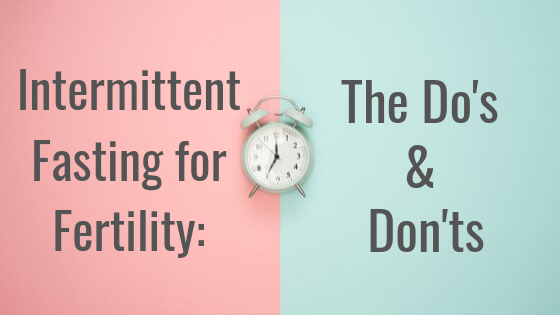
Everything old is new again and, just like my high-rise jeans from 1992, the practice of fasting is no exception. Humans have fasted for survival since well, forever. Nowadays, health pros are raving about its anti-cancer benefits and celebrities are using it to fit into their Oscar dresses. But is it the best practice if you’re trying to rev up your fertility game?
I get questions about fasting all the time and many people are surprised to find out that do I recommend it and use it for some of my clients. But it’s definitely not for everyone, and in some cases can worsen hormonal imbalance and cycle issues if you aren’t careful!
Here, I’m breaking down what we know about intermittent fasting and female hormones so you can figure out if it’s a good plan for you.
What is intermittent fasting?
Fasting, intermittent fasting, or timed eating simply means that you go for a period of time without food. In medical terms, it takes a minimum of 12 hours to be in a “fasted state” where your body has used up its stored glucose (AKA glycogen) and starts breaking down fat for energy.
There are several different fasting plans out there, here are some of the most popular ones:
-
5/2 plan: Limiting to 500 kcals 2x/wk and then eat as you please the other 5 days.
-
Alternate Day: Limiting to 500 kcals every other day and eat as you normally would on alternate days.
-
16/8: Fast for 16 hours a day then have an 8-hour “eating window”. This type of fasting can be used daily, every other day, or just a few times a week.
-
24-hr or Eat Stop Eat: Water, tea or coffee for 24 hours and then eating sensibly on non-fasting days. These longer fasts are challenging and only used a couple of times a week rather than daily.
Let’s take a look at the research
Some of the research is positively glowing about all the benefits of fasting, including improved insulin sensitivity, reduced inflammatory markers, improved autophagy (fancy way of saying your body killing off bad cells), and lowered risk of cancer and chronic disease. Hell, even a few studies have suggested it can help you sleep better and boost your energy levels.
Sounds pretty great right?! Just hold on a sec before your start canceling all your lunch dates.
One study on alternate day fasting with mice showed that after 12 weeks, female mice had lower blood sugar and body weight – both can be good for fertility. However, the lady mice also had reduced FSH (follicular stimulating hormone – kickstarts egg development) and LH (luteinizing hormone -responsible for kicking mature egg out of ovary) levels along with ovary size. Not so good.
In another study, 15 women with PCOS followed a very low-calorie diet (~471 calories/day) for 7 days and this increased their already high levels of LH and lowered circulating FSH. Not good. BUT in the same study, fasting also reduced serum insulin and leptin levels for the female subjects. Which is good, at least in some cases.
Other than that, there’s not much new information out there ladies.
Unfortunately, most of the research available has been done on rodents, post-menopausal women, and men. Most of the information we have on women are observations gathered during extreme periods of food deprivation like famine or anorexia. There are no well-constructed studies on intermittent fasting and human female fertility.
Female fertility is a tricky beast.
It’s a delicate dance between your hypothalamic, pituitary, and ovarian hormones (otherwise known as your HPO axis). During periods of physical or mental stress the hypothalamus will slow down kisspeptin and GnRH (gonadotropin releasing hormone) production which puts kibosh on ovulation until your body senses the danger has passed. It doesn’t matter if it’s an actual famine or a crash diet; your body can’t tell the difference real danger and self-imposed stress.
Fasting for long periods of time can be both mentally and emotionally challenging so it makes sense that it could mess your hormones.
BUT, most professionals will agree that reducing inflammation, improving insulin sensitivity, and getting to a healthy body weight are all good for fertility.
So what to do?? Can you still get the benefits of fasting while trying to achieve a pregnancy? In my experience, yes, if you do it right. Fasting too long will shut down sex hormone flow and ovulation. Not fasting long enough won’t do much of anything.
I like my fasting just like Goldilocks, right in the middle
To get the best of both worlds, you might try a shorter daily fasting period (12-14 hours) combined with limited snacking between meals. With a 12-14 hour fasting window, your GI tract will have time to rest and repair overnight and your hormones get a much-needed break. Between meals, the body needs time to digest meals and bring your hormones back down to baseline.
Fasting trick: add in a fat source during your fast. Female sex hormone production is dependent on fat intake and adding a little fat will keep your overall calorie intake stable without stimulating insulin release. I like to throw a tbsp of organic heavy cream into my morning coffee. You could also use grass-fed butter or ghee, MCT oil, or coconut oil.
I’m a big fan of lists (seriously, you should see my refrigerator). So, here are my do’s and don’ts of intermittent fasting:
Do:
-
Include a fat source during your fast.
-
Increase the size of your meals and make sure you’re getting enough protein and fat if you’re feeling hungry soon after eating. It typically takes 4-6 hours to digest a balanced meal.
-
Sip on a cup of bone broth for a boost of collagen and sodium between meals
-
Make sure to include a high-quality multivitamin or prenatal multivitamin.
-
Take your vitamins with a meal for improved absorption of fat-soluble vitamins A, D, E, & K.
-
-
Drink plenty of water, tea, and water-infusions to keep you hydrated. My favorite hydration indicator is clear or very light-yellow urine.
-
Break your fast with a high-quality meal that you take some time to eat. You didn’t spend all morning doing all this awesome hormone work just to throw it out the window for a bag of Cheetos standing at the water cooler hiding from your boss. Take your time eating something nutritious and satisfying that includes a high-quality protein source, tasty vegetables and slow digesting carb. See below for a sample day.
-
Consult a professional if you experience any negative cycle changes, mood swings, or physical symptoms such as dizziness, headache or fainting.
Don’t:
-
Fast for longer than 16 hours if you’re trying to get pregnant.
-
Limit calories once your fasting window has passed. Extreme calorie restriction is a recipe of hormonal disaster. Instead, focus on nourishing your body with whole foods that satisfy you and replenish your glycogen (body’s stored form of energy), and vitamins and minerals.
-
Go overboard on the exercise. Moderate exercise is cool (think 4-6 on a scale of 1-10) but avoid balls-to-the-wall workouts that overly stress out your system. Excess physical activity can actually put your body into metabolic distress which can backfire on your hormone balance.
-
Go overboard on the caffeine. Everyone’s caffeine tolerance is different, so you’ll have to make the call on this one. Don’t be surprised if you notice you’re more sensitive to caffeine during a fasting period.
-
Take note of how you feel after you drink caffeine. Are your hands shaking? Is it improving your concentration or taking away from it? How’s your stomach doing? Adjust your daily amount as needed.
-
-
Use fasting if you have a history of adrenal fatigue, disordered eating, or struggle with anxiety. Extended fasts can ramp up adrenal stress and symptoms associated with it. None of which is helpful for regular menstrual cycles or fertility.
-
Use intermittent fasting during pregnancy. Restrictive eating while growing a baby puts you at risk for vitamin and mineral deficiencies as well as pregnancy complications.
Sample 14-hour fasting day:
-
6 am – 12 oz coffee with 2 tbsp organic heavy cream
-
8 am – 3 Omelet muffins with sausage, peppers, and spinach
-
1 pm – Turkey wrap on sprouted tortilla with lettuce, tomato, mayo, and avocado. Carrots and hummus on the side
-
3 pm – 1 cup of bone broth
-
6 pm –Grilled chicken thighs with roasted sweet potatoes and side salad with mixed greens, tomatoes, with sunflower seeds and ground flaxseed sprinkled on top and balsamic vinaigrette
How to get started
If intermittent fasting sounds like something you want to try it out, start by just cutting back on the snacking between meals. Even short periods of fasting (4-6 hours) can help improve your insulin sensitivity and overall hormone balance.
Cutting out snacks may be as far as your body wants to take it or you might find that you want to go a little longer. This is when it’s helpful to work with a trained practitioner (wink, wink) so that you can find your sweet spot without screwing up your cycles.
As always, consult with your doctor before starting a new plan. Just because I’ve put it out into the internet doesn’t mean it’s the right plan for you.
If your doctor has never heard of intermittent fasting and doesn’t know your chart from the 15 other people in the waiting room, schedule a free 30-minute fertility strategy session with me and we can see if fasting is a good option for you
Cheers,
Whit


+ Show Comments
- Hide Comments
add a comment